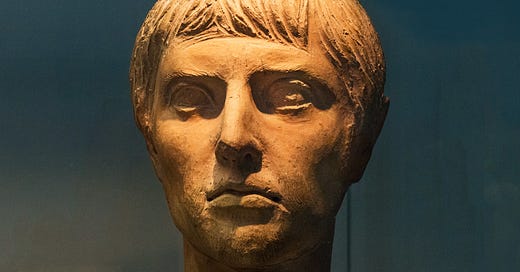Fresh Batch #35: Etruria, Metals, and Ancient Italy
A Culture that Peopled the World
Liam Gallagher looks like an Ancient Italian because Italy was the first great colony of Phoenicia and they peopled Britain, as proven by the British languages deriving from Etrusco-Phoenician and the Irish Bethluisnion and Bobeloth alphabets both having the same corresponding Phoenician letters that were also given to the Greeks c. 500 BC.




The entire narrative of Phoenicians originating in Asia Minor is predicated on Mosaic history, things like Canaanites, Israel, and other fictions passed off as Truth by religious institutions so that they can presume authority over you, details that were debunked centuries ago yet still permeate the entirety of academia. If this is a new concept for you, start at Book I of the Spirit Whirled series (click the link) and learn the ancient universal system:
From A Godsacre for Winds of the Soul, “Canaan’s root is kana, which is to syncretize, or to give up individual leanings in order to unite more effectively as a group, while kin’a means a bundle or pack. Recall the Hebrew word for whirl is tevél, and so Tubalcain is the whirl of Canaan, the syncretizing of the stars.”
From the same book, “The Phoenicians called Saturn (Kronos) by the name Israel according to Porphyry, cited by Eusebius.”
I demonstrated that Saturn is an old name for the sun before it was ascribed to the planet in 1st century AD and that critical takeover/transition at the Common Era. Thus, the Phoenicians, who thrived several millennia before the name Kronos was ascribed to a planet, referred to the sun, Israel, which could be Is (Savior; Deliverer) + Ra (Sun) + El (God), with its twelve tribes being the twelve signs of the Zodiac. Nothing that comes from scripture is historical, certainly not the history of the Phoenicians or Etruscans. Not one Greek writer even mentions Moses prior to the end of the 3rd century (c. 270 AD). Mosaic history is a product of the modern era incorporating old allegories from the mystery schools primarily out of Alexandria. For those who refuse to acknowledge that, usually of a Christian disposition, you don’t have a choice. The Father of Ecclesiastical History, who wrote everything you think you know about the history in the Bible, Eusebius, also admitted, “Those ancient Theraputæ were Christians, and their writings are our Gospels and Epistles.”
Theraputæ were a Jewish-Buddhist sect in Alexandria, from the orient. That’s where Gnosticism comes from. Read Spirit Whirled: Terminalia to dive deeper into the origins of your religious institutions.
Bethan claimed navigators were referred to as Puni on Etruscan tablets, and if the voyagers were Etruscans, then it’d make them known as Puni (I need more evidence before I can feel comfortable with this claim). I have several issues with this, namely that there aren’t enough writings left behind by the Etrusco-Phoenicians to translate their language, but this might be problem that has arisen in the past century or so and older generations may have had access to more tablets. If Betham was correct, then it is significant because Etruscan words for things of a purple nature have Puni in their root, such as words for mead and clothing. Most significantly, it’d confirm what my work claims, that the Etruscans are Phoenicians, as Puni and the Latin Poeni, or Phoeni, or the Italian Veni (Venice), or the Irish Feni (Fenians, their word for Phoenicians), etc. are all philologically the same. The name for the planet Saturn was Faeno before it was ascribed the Greek name Kronos in the 2nd century BC, which is philologically the same, and the transliteration of Rune is Runo (ᚱᚢᚾᛟ). Punic, or Phoenician, is Runic.
Unfortunately, one can only trace language so far back before he must rely on other disciplines in his search for diffusion between cultures. So allow me to provide you with another resource that may yield results in the disciplines of mining and smelting metals, and the implications of finding certain techniques, or a lack thereof, in various regions.
Michael Grant wrote (The Etrus. p. 10), “Etruria had other natural advantages. For millennia, its soil had provided summer and winter pasture for migrating flocks. Moreover, once the forests were cleared and the marshes and floodlands drained, it was second to no other land in fertility—as the ancient writers pointed out, recording some of the highest crop yields ever known in antiquity.” (Diodorus V, 316.)








For those interested in Phoenicians, and the history of places peopled by them such as Britain, the Iberian Peninsula, North Africa, and Scandinavia, become a member to access the rest of this article.
Keep reading with a 7-day free trial
Subscribe to Ancient History, Mythology, & Epic Fantasy to keep reading this post and get 7 days of free access to the full post archives.





